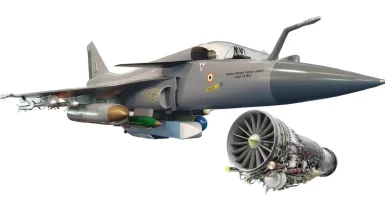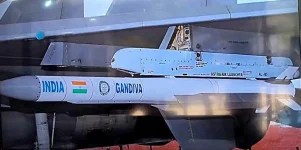- Views: 4K
- Replies: 25
India's indigenous fighter jet program received a significant boost as Air Chief Marshal Amar Preet Singh, the newly appointed Chief of the Air Staff (CAS), announced a firm timeline for the Tejas MkII.
During a press briefing on Friday, the CAS confirmed that the Tejas MkII is scheduled for its inaugural flight next year, with the research and development phase concluding by December 2027. The Indian Air Force (IAF) anticipates inducting the first units of this advanced fighter jet by 2028.
This announcement comes as welcome news for the IAF, which has committed to procuring at least 120 Tejas MkII aircraft. The MkII is expected to play a crucial role in modernizing the IAF's combat fleet, replacing aging aircraft and providing a significant boost to India's air power capabilities.
"The MkII is supposed to make its first flight sometime next year, and it is expected to be inducted by 2028. We have planned for at least 120 LCA Mark-2 planes," stated Air Chief Marshal Singh.
Designed as a more potent successor to the Tejas Mk1, the MkII boasts enhanced range, increased payload capacity, and advanced avionics. The CAS emphasized the advantage of indigenous development, highlighting the ease and speed of integrating new weapon systems onto the Tejas MkII compared to imported platforms. This agility is vital for the IAF's ongoing modernization efforts.
Reflecting on past delays in the Tejas Mk1 program, Air Chief Marshal Singh stressed the importance of learning from those experiences. He identified technology transfer from design to production, even within India, as a key challenge that needs to be addressed to ensure timely delivery of the MkII.
"As far as Tejas MkII and AMCA are concerned, we all need to learn our lessons about what happened over Mk1 and what caused the delays. We should make sure that such things are ironed out," he asserted.
In a significant departure from tradition, the CAS advocated for greater private sector involvement in defence production. "I don’t think we can continue relying on one agency. HAL will have its own limitations in terms of what it can do within a time frame, we need to have private industry chipping in and coming in a big way," he stated.
This call for increased collaboration aligns with the Aeronautical Development Agency's (ADA) recent Expression of Interest (EOI) to private companies for the production of structural components for the Tejas MkII.
The ADA's EOI seeks private sector participation in manufacturing critical components like fuselage sections, wings, tails, and canards. This initiative aims to accelerate production and ensure the timely delivery of the Tejas MkII.
Air Chief Marshal Singh's clear vision for the Tejas MkII program and his emphasis on collaboration between HAL and the private sector signal a new era in Indian defence production.
With a defined timeline and a commitment to learning from past challenges, the IAF is poised to realize its goal of a modernized, indigenously produced combat fleet, contributing significantly to India's "Atmanirbhar Bharat" (self-reliant India) vision.


